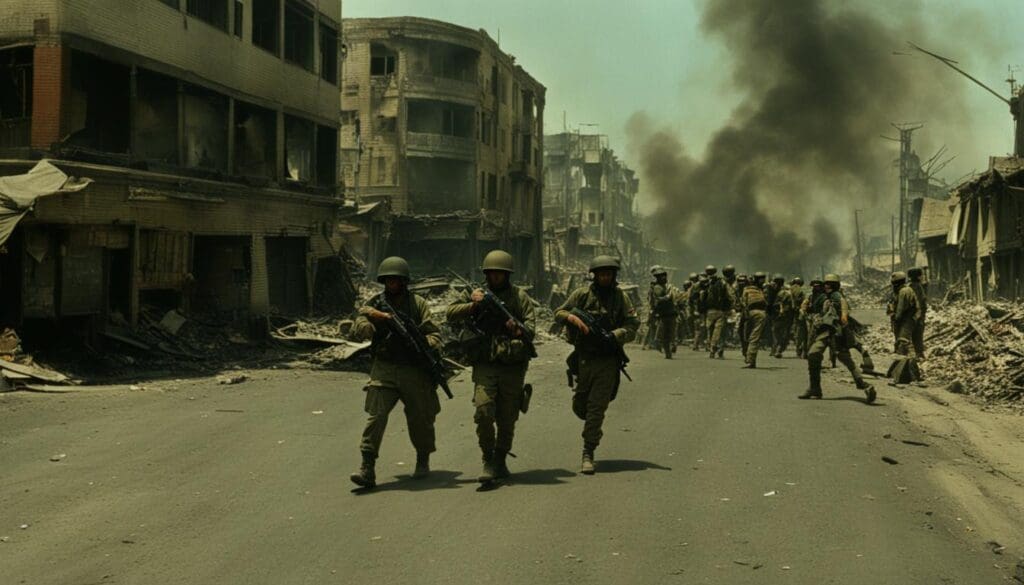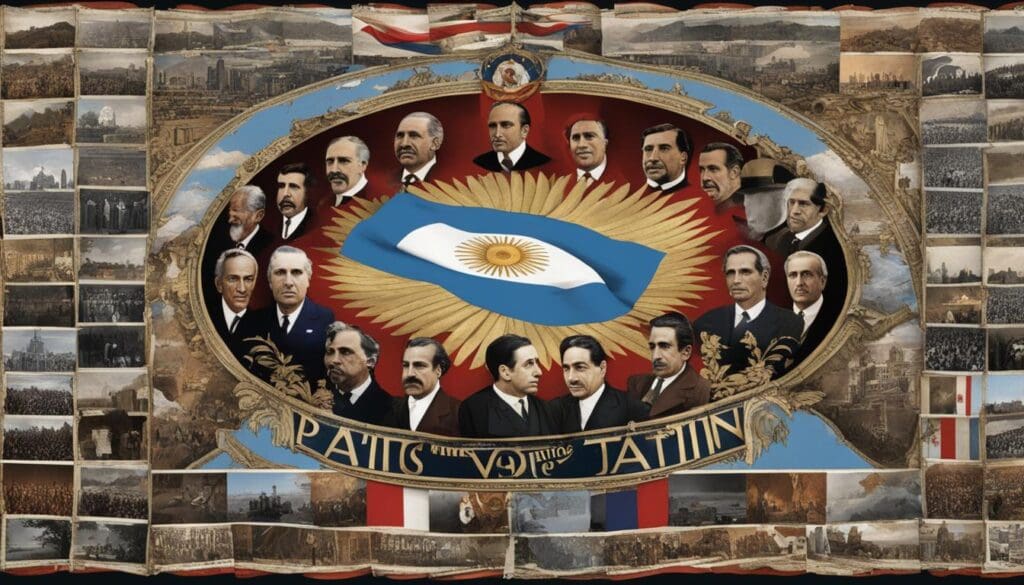Argentina’s political history is a rich tapestry of power struggles, influential leaders, and significant events that have shaped the nation’s trajectory. From the rise of Juan Perón and Peronism to the dark days of the military dictatorship, Argentina’s political landscape has undergone dramatic shifts. Understanding this history provides valuable insights into the challenges and opportunities that lie ahead for Argentina.
Key Takeaways:
- Argentina’s political history is marked by power struggles and influential leaders.
- Peronism, led by Juan Perón, had a lasting impact on Argentine politics.
- The military dictatorship during the Dirty War left a dark legacy of human rights violations.
- The country transitioned to democracy in the 1980s, overcoming challenges and political instability.
- Economic crises and political turmoil have shaped Argentina’s political landscape.
The Era of Juan Perón and Peronism
One of the most influential periods in Argentina’s political history was the era of Juan Perón and the rise of Peronism. Perón, a charismatic leader, implemented social and economic reforms that aimed to improve the lives of the working class. His populist policies resonated with the masses, leading to significant political influence and the establishment of the Peronist movement. Peronism has since become a dominant force in Argentine politics, with multiple Peronist presidents and ongoing debates about its impact on the country.
Under the leadership of Juan Perón, Argentina witnessed a period of political transformation and social change. Perón’s policies focused on labor rights, social welfare programs, and industrialization. His government implemented measures such as workers’ rights legislation, the development of state-owned industries, and redistributive economic policies.
The influence of Peronism extended beyond Perón’s presidency, with subsequent Peronist leaders maintaining a stronghold on Argentine politics. This political movement has been characterized by a mix of populist rhetoric, nationalist sentiment, and a focus on social justice. The enduring legacy of Peronism has shaped Argentina’s political landscape and continues to influence public policy debates to this day.
| Key Reforms | Impact |
|---|---|
| Workers’ rights legislation | Improved labor conditions and increased worker protections |
| Social welfare programs | Reduced poverty and inequality, provided social safety nets |
| Redistributive economic policies | Addressed income disparities and promoted wealth redistribution |
| Industrialization | Boosted economic growth and expanded manufacturing sector |
The era of Juan Perón and the rise of Peronism marked a significant chapter in Argentina’s political history. The impact of Peronism on Argentina’s society, economy, and political system cannot be understated. However, as with any political movement, Peronism has its critics and supporters, with ongoing debates about its long-term consequences and effectiveness. Understanding the era of Juan Perón and Peronism is crucial for comprehending the dynamics of Argentina’s political landscape and the factors that continue to shape the nation today.
The Military Dictatorship and the Dirty War
During the years from 1976 to 1983, Argentina endured a dark period of military dictatorship characterized by human rights violations and state-sponsored terrorism. This infamous era, commonly referred to as the Dirty War, witnessed the systematic persecution, torture, and forced disappearances of individuals deemed to be political opponents by the government. The consequences of this brutal regime have had a lasting impact on the nation’s history and collective memory.
The military dictatorship justified its actions by claiming to be fighting against leftist subversion and seeking to restore order and stability. However, the methods employed by the regime were inhumane and violated basic human rights. Thousands of people, including activists, students, intellectuals, and civilians, were abducted, tortured, and ultimately disappeared. The exact number of victims remains unknown, with estimates ranging from 10,000 to 30,000.
The Dirty War not only caused immense suffering to individuals and families but also left deep scars on Argentine society. The wounds of this period continue to impact the country, as efforts to uncover the truth, seek justice, and honor the memory of the disappeared persist. Human rights organizations, survivors, and their families work tirelessly to ensure that the atrocities committed during the military dictatorship are never forgotten and that those responsible are held accountable.

Impact on Argentine Society
The legacy of the Dirty War has had a profound effect on the social fabric of Argentina. The trauma experienced during this period still resonates with the collective consciousness, shaping the nation’s identity and political landscape. The human rights violations committed during the military dictatorship have served as a catalyst for social movements and advocacy groups dedicated to promoting human rights, democracy, and justice.
| Impact | Description |
|---|---|
| Human Rights Activism | The Dirty War galvanized human rights activism in Argentina, leading to the emergence of organizations such as the Mothers and Grandmothers of Plaza de Mayo. These groups played a crucial role in raising awareness, demanding accountability, and supporting the families of the disappeared. |
| National Reconciliation | Efforts to achieve national reconciliation and address the crimes committed during the military dictatorship have been ongoing. Truth and justice initiatives, including the establishment of the National Commission on the Disappearance of Persons (CONADEP) in 1983, aimed to document the atrocities and pave the way for healing. |
| Memorialization | Memorial sites, such as the Parque de la Memoria in Buenos Aires, have been created to commemorate the victims of the Dirty War. These spaces serve as a reminder of the atrocities committed and provide a place for reflection, remembrance, and education. |
Remembering the Disappeared
One of the most poignant aspects of the Dirty War is the ongoing quest to remember and honor the victims who disappeared during this dark chapter in Argentina’s history. As part of this effort, the Argentine government has officially recognized March 24th as the Day of Remembrance for Truth and Justice, commemorating the anniversary of the military coup that marked the beginning of the dictatorship.
- Public demonstrations, marches, and vigils are held every year to remember the disappeared and demand justice for their families.
- The Grandmothers of Plaza de Mayo continue their tireless search for the grandchildren of those who were disappeared, using DNA testing to identify individuals who were forcibly taken from their parents during the dictatorship.
- The quest for justice and accountability remains an ongoing struggle, as legal processes continue to unfold and the search for the truth persists.
Transition to Democracy and the Falklands War
Following seven years of military dictatorship, Argentina underwent a significant transition to democracy in 1983. This historic moment was marked by the election of Raúl Alfonsín as president and was seen as a turning point in the country’s political history. The transition was not without challenges, as Argentina faced political instability and economic crisis.
During this period, Argentina also faced the Falklands War, a conflict with the United Kingdom over the sovereignty of the Falkland Islands. The war resulted in a military defeat for Argentina and had profound consequences for the political landscape. It further heightened political instability and strained the country’s economy, exacerbating the challenges faced during the transition to democracy.
Despite these challenges, the transition to democracy laid the foundation for a more stable political system in Argentina. It allowed for the development of democratic institutions, the protection of human rights, and the restoration of civil liberties. The transition represented a significant step towards a more inclusive and participatory political system for the Argentine people.
The Impact of the Falklands War
The Falklands War not only had immediate consequences for Argentina’s military and political leadership but also had a lasting impact on the country’s national identity and foreign policy. The military defeat led to widespread disillusionment and a loss of confidence in the military regime. It also fueled a sense of nationalism and pride among the Argentine people, as the conflict was seen as a fight to reclaim Argentine territory.
Internationally, the Falklands War strained Argentina’s relations with the United Kingdom and had implications for its standing in the global arena. The conflict highlighted the limitations of Argentina’s military power and underscored the need for a more diplomatic approach to territorial disputes. It also led to a shift in the country’s foreign policy, with subsequent governments placing a greater emphasis on regional integration and cooperation.
Overall, the transition to democracy and the Falklands War were pivotal moments in Argentina’s political history. They shaped the country’s political landscape and had far-reaching consequences for its domestic and international affairs. Understanding these events is crucial to gaining insights into the challenges and opportunities that have shaped Argentina’s political development.

Falklands War by the Numbers
| Year | Duration | Argentine Casualties | British Casualties |
|---|---|---|---|
| 1982 | 74 days | 649 | 255 |
The Falklands War lasted for 74 days in 1982. During the conflict, Argentina suffered a total of 649 casualties, including both military personnel and civilians. On the other side, the British forces reported 255 casualties. These numbers highlight the human cost of the war and the sacrifices made by both Argentina and the United Kingdom.
Economic Crises and Political Turmoil
Argentina has faced numerous economic crises and political turmoil throughout its history, leading to significant challenges and social unrest. Hyperinflation, government corruption, and mismanagement of the economy have been recurring issues plaguing the country. These problems have had a profound impact on Argentina’s political landscape and have sparked ongoing debates and discussions.
One notable economic crisis occurred in 2001 when Argentina experienced a severe financial collapse. The country was plunged into a deep recession, resulting in widespread poverty and social unrest. The crisis led to a series of protests and political instability, ultimately leading to the resignation of several presidents. This event highlighted the deep-rooted economic challenges that Argentina has faced and the need for comprehensive reforms.
In addition to economic crises, government corruption has also been a persistent issue in Argentina. Scandals involving high-ranking officials and embezzlement of public funds have further undermined the public’s trust in the government. These instances of corruption have eroded confidence in political institutions and fueled social discontent.
Examples of Economic Crises and Political Turmoil in Argentina
| Year | Event |
|---|---|
| 1989 | Hyperinflation crisis, resulting in an annual inflation rate of over 3,000% |
| 2001 | Severe economic crisis, leading to a default on international debt and widespread social unrest |
| 2015 | Allegations of corruption against the government of Cristina Fernández de Kirchner |
| 2018 | Economic recession and currency devaluation, exacerbating socio-economic inequality |
- Hyperinflation crisis in 1989 resulted in an annual inflation rate of over 3,000%.
- A severe economic crisis in 2001 led to a default on international debt and widespread social unrest.
- In 2015, there were allegations of corruption against the government of Cristina Fernández de Kirchner.
- In 2018, Argentina faced an economic recession and currency devaluation, exacerbating socio-economic inequality.
These examples demonstrate the cyclical nature of economic crises and political turmoil in Argentina. The country has faced multiple challenges, each impacting its political stability and economic well-being. Addressing these issues requires a comprehensive approach that includes transparent governance, economic reforms, and measures to combat corruption.
Kirchnerism and the Return of Peronist Rule
The early 2000s saw the rise of Kirchnerism, a political ideology associated with Nestor Kirchner and his wife Cristina Fernández de Kirchner. Kirchnerism marked the return of Peronism to the forefront of Argentine politics, with a focus on populist policies and social justice. Under the Kirchners’ leadership, the government implemented measures to reduce poverty, increase social welfare programs, and promote economic growth.
One of the key aspects of Kirchnerism was the emphasis on state intervention in the economy. The government took control of key industries, implemented protectionist policies, and increased public spending to stimulate growth. These measures aimed to address social inequality and provide greater opportunities for marginalized groups.
The Impact of Kirchnerism
Kirchnerism was met with both praise and criticism. Supporters hailed the government’s efforts to address social issues and reduce poverty, pointing to the expansion of social welfare programs and increased access to healthcare and education. Critics, on the other hand, raised concerns about the government’s heavy-handed approach to the economy, citing inflation, lack of investment, and restrictions on the private sector.
Despite the controversies, Kirchnerism’s influence on Argentine politics and society cannot be denied. The Kirchners laid the groundwork for the return of Peronism and cemented its position as a dominant force in Argentine politics. The legacy of Kirchnerism continues to shape political debates and policies in the country, with ongoing discussions about the role of the state, social justice, and economic development.
| Pros | Cons | |
|---|---|---|
| Economic Policies | – Increased social welfare programs – Reduction in poverty rates – Focus on social justice |
– Inflation – Lack of private sector investment – Restrictions on the economy |
| Social Impact | – Expansion of healthcare and education access – Efforts to reduce social inequality – Support for marginalized groups |
– Criticism of government intervention – Lack of long-term sustainability – Unequal distribution of resources |
| Political Influence | – Return of Peronism – Cemented Peronism as a dominant political force – Shaped ongoing political debates |
– Polarizing effect on society – Exclusion of opposing political ideologies – Controversies surrounding government actions |
Recent Political Developments and Challenges
In recent years, Argentina has witnessed significant political developments and faced a range of challenges. The presidency of Mauricio Macri brought about economic reforms aimed at stabilizing the country’s economy and attracting foreign investment. However, these measures also sparked controversy as they were accompanied by austerity measures that some argued disproportionately impacted low-income families.
Amidst these economic reforms, Argentina continued to grapple with political polarization, which has been a longstanding challenge. Divisions between different political factions have hindered progress on key issues and often resulted in gridlock and a lack of consensus.
The current government, led by Alberto Fernández, has faced its own set of challenges, most notably the COVID-19 pandemic. The pandemic has had a severe impact on the country’s economy, leading to job losses, business closures, and increased poverty rates. The government has implemented measures to address these challenges, including economic stimulus packages and social assistance programs. However, the effectiveness of these measures has been the subject of ongoing debate, with some questioning their long-term sustainability.
Additionally, Argentina has been dealing with other contentious issues, such as the debate over abortion rights and calls for judicial reform. These topics have further contributed to political polarization and highlighted the deep divisions within Argentine society. As the country navigates these challenges, finding common ground and fostering dialogue will be crucial to ensuring a path forward that addresses the needs and aspirations of all Argentinians.
Key Political Developments and Challenges
- The presidency of Mauricio Macri and his economic reforms
- Political polarization and the challenges of consensus-building
- The impact of the COVID-19 pandemic on the economy and the government’s response
- The ongoing debates over abortion rights and calls for judicial reform
These recent political developments and challenges have highlighted the complex nature of Argentina’s political landscape. As the country continues to navigate these issues, it is important to foster open dialogue, promote inclusivity, and work towards finding common solutions that benefit all Argentinians.
Conclusion
In conclusion, Argentina’s political history is a complex tapestry that has been shaped by power struggles, influential leaders, and significant events. From the era of Juan Perón and the rise of Peronism to the military dictatorship and the return to democracy, each phase has left a lasting impact on the nation.
Throughout the years, Argentina has faced economic crises, political turmoil, and social unrest. Hyperinflation, government corruption, and mismanagement of the economy have been recurring challenges. However, the country has also witnessed periods of progress and reform, with leaders implementing policies focused on social justice and economic stability.
Looking ahead, Argentina continues to grapple with political polarization and ongoing debates regarding various issues such as abortion rights and judicial reform. The COVID-19 pandemic has added further complexity to the current political landscape. It is through a deep understanding of Argentina’s political history that we can gain insights into the challenges and opportunities that lie ahead for the nation.
FAQ
What are some key moments in Argentina’s political history?
Some key moments in Argentina’s political history include the era of Juan Perón and the rise of Peronism, the military dictatorship and the Dirty War, the transition to democracy and the Falklands War, and the recent rise of Kirchnerism.
What was the Dirty War in Argentina?
The Dirty War refers to a period of military dictatorship in Argentina from 1976 to 1983 characterized by human rights violations, state-sponsored terrorism, and widespread persecution, torture, and forced disappearances of political opponents.
How did the Falklands War impact Argentina’s political landscape?
The Falklands War, in which Argentina was militarily defeated by the United Kingdom in 1982, further complicated Argentina’s political landscape during the transition to democracy, adding to the challenges of economic crisis and political instability.
What have been some challenges in Argentina’s political history?
Argentina has faced multiple economic crises, political turmoil, hyperinflation, and government corruption throughout its history. These challenges have often led to periods of instability and social unrest.
What is Kirchnerism?
Kirchnerism refers to a political ideology associated with Nestor Kirchner and his wife Cristina Fernández de Kirchner. They implemented populist policies focused on social justice and increased state intervention in the economy, marking a return of Peronist rule in Argentina.
What are some recent political developments in Argentina?
The presidency of Mauricio Macri brought about economic reforms but faced criticism for austerity measures and social inequality. The current government, led by Alberto Fernández, is dealing with the COVID-19 pandemic and its impact on the economy, as well as political polarization and debates on issues like abortion rights and judicial reform.






